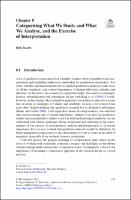Chapter 8 Categorising What We Study and What We Analyse, and the Exercise of Interpretation
Author(s)
Jacobs, Dirk
Collection
European Research Council (ERC); EU collectionLanguage
EnglishAbstract
A lot of qualitative researchers have a healthy wariness about straightforward categorisation
and modelling endeavours undertaken by quantitative researchers. Too
often, variables and measurements are too rigid in quantitative analysis to take stock
of all the complexity and context-dependency of human behaviour, attitudes and
identities. In the worst-case scenario for migration studies, this leads to oversimplification,
essentialisation and culturalism. In line with King et al. (1994), I would,
however, in this chapter, like to plead for qualitative researchers to take into account
that, in terms of challenges of validity and reliability, we have a lot to learn from
each other. Acknowledging that qualitative research has its distinctive advantages
(Brady and Collier 2004), I will argue that choices in categorisation, case selection
and research design are of crucial importance, perhaps even more in qualitative
studies than in quantitative studies, even if in both methodological traditions we are
confronted with similar challenges. Being transparent and reflecting on the consequences
of our choices of categorisation, analysis and interpretation is of crucial
importance. It is too easy to think that qualitative research would, by definition, be
better equipped in doing justice to the phenomena we wish to study in the field of
migration, especially if our research focusses on migrants.
Keywords
Categorisation; Ethnic minorities; Migration Methodology; Comparison; Validity; Reliability; Control-group; Brussels; Demography; Dependent and independent variables; European Union; Labour economics; Qualitative research; Research design; Social science; UnemploymentDOI
10.1007/978-3-319-76861-8_8ISBN
9783319768618OCN
1051780114Publisher
Springer NaturePublisher website
https://www.springernature.com/gp/products/booksPublication date and place
Cham, 2018Grantor
Classification
Migration, immigration and emigration
Relating to migrant groups / diaspora communities or peoples


 Download
Download